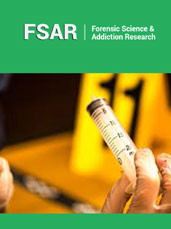- Submissions

Abstract
Forensic Science & Addiction Research
Neuro-Ethics and Biotechnology: An Emerging Community Challenge
-
Open or CloseAbeer M Hagras*
Department of Forensic Medicine and Clinical Toxicology, Faculty of Medicine, Suez Canal University (SCU), Egypt
*Corresponding author:Abeer M Hagras Department of Forensic Medicine and Clinical Toxicology, Faculty of Medicine, Suez Canal University (SCU), Ismailia, Egypt
Submission: February 13, 2023;Published: April 04, 2023

ISSN: 2578-0042Volume6 Issue2
Abstract
Background: Our new knowledge has begun to spill into the community as neuroscience raises new
ethical, legal, and social concerns. The brains of “normal” people in some imaging studies yield clinically
significant findings disconcertingly. What kind of information and follow-up do we owe those people?
Some studies may have military implications; such as that, brain stimulation created an indefinitely
awake and alert soldier or pilot. A new fascinating research area studying “Ethics of neuroscience”
as neuroscientists explore how brains make decisions when confronted with moral dilemmas. The
implications are unclear. Researchers point to three categories of existing consumer technology brain–
computer interfaces for device control or self-monitoring, devices for noninvasive neuro-stimulation,
and neuro-marketing applications of imaging technology and argue that the brain data collected pose
significant privacy and information security risks. Although the topic of Direct to Consumer (DTC)
neuro-technology certainly warrants attention, the commentary contains factual and conceptual errors
that not only distort the reality of current DTC neuro-technology and its regulatory oversight but also
misrepresent the state of the science. These misrepresentations, combined with unbridled speculation
about the inevitability of widespread, highly accurate, DTC neuro-monitoring devices that can collect
revealing personal information, prompt the authors to suggest impractical solutions to privacy and
security concerns.
Conclusion: Researchers have a responsibility to prevent misuse of neuroscience new technology,
they need to point out when unproven new technologies are being used recklessly and to explore the
social consequences of effective new technologies. There is urgent need to maximize the benefits of the
applications of neuroscience and minimize their risks with implementation of Nero-ethics guidelines.
Keywords:Brain leaks; Consumer; Neuro-technology
 a Creative Commons Attribution 4.0 International License. Based on a work at www.crimsonpublishers.com.
Best viewed in
a Creative Commons Attribution 4.0 International License. Based on a work at www.crimsonpublishers.com.
Best viewed in 







.jpg)






























 Editorial Board Registrations
Editorial Board Registrations Submit your Article
Submit your Article Refer a Friend
Refer a Friend Advertise With Us
Advertise With Us
.jpg)






.jpg)














.bmp)
.jpg)
.png)
.jpg)










.jpg)






.png)

.png)



.png)






